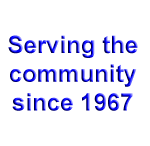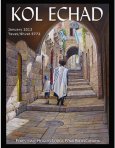
As I See It

Marc Kates

|
Forestdale Heights Lodge As I See It |
 Marc Kates |

|
 In January 2012, I penned my very first column of “As I See It” for Kol Echad (cover at right). Seeing as it is now January 2025, I guess this means that my column has become bar mitzvah. Wow! It’s hard to imagine that 13 years have flown by. This column’s infancy began with Jeff Rosen posing the question if I’d like to take over my late mother’s column. Like any new venture, I didn’t know in what direction I’d take the column, how long I would write for, and would I be any good at it – after all, it wasn’t my original column in the first place. Thirteen years later, here I sit, expressing myself, based on the thoughts I’ve collected during the past little while.
In January 2012, I penned my very first column of “As I See It” for Kol Echad (cover at right). Seeing as it is now January 2025, I guess this means that my column has become bar mitzvah. Wow! It’s hard to imagine that 13 years have flown by. This column’s infancy began with Jeff Rosen posing the question if I’d like to take over my late mother’s column. Like any new venture, I didn’t know in what direction I’d take the column, how long I would write for, and would I be any good at it – after all, it wasn’t my original column in the first place. Thirteen years later, here I sit, expressing myself, based on the thoughts I’ve collected during the past little while. Sometimes, it’s difficult to generate ideas for Kol Echad, and other times, the ideas just seem to flow. I’ve found writing “As I See It” a therapeutic, creative release. When cobbling ideas together, I often seek inspiration from my mother’s columns. Even 13 years after her passing, she is still able to share her thoughts with me, and when I read over her words, I can’t help but get those “warm fuzzies.” She writes about politics, life events, pet peeves, friends and family, and world events. When taking those trips down memory lane, I get those “Oh yeah” moments when I say to myself, “I remember that happening,” or, “So those were her thoughts at the time.” I did that again for this edition of Kol Echad, as it continues to pique my curiosity to see where we both stand on various topics.
Our eldest has been to Israel numerous times. I questioned him, “Why now, when there seems to be so much turmoil and chaos, would he choose now to be there?” He answered simply, “If ever there was a time in our history that our brothers and sisters need to know we care, it’s now.” In the 22 years since I said those words to my parents, I shared those same sentiments with people around me about my summer trip to Israel, especially in the aftermath of October 7. At least I am consistent, and my support for the State of Israel is unwavering. In that same column, she writes: When my oldest son called from Israel to see if we had heard of the F-16 that had dropped a bomb on a Hamas leader, killing others – he called to say he was okay. He also added that Hamas was now saying they will retaliate with more suicide bombs aimed at civilians and tourists. My heart honestly skipped more than just a beat…
In September 2003, my mom, who, by this time, was editor of Kol Echad, wrote about antisemitism and the Toronto police: Our world is changing drastically these days. The security that we deal with on a daily basis is becoming more “stepped up” with each passing day. This is not a new concept for Jews. With protests and counter-protests, encampments, marches, and vile social media posts, our world continues down a trajectory that rattles me. My mother’s words are as relevant today as they were when she wrote them in 2002 and 2003. In some way, I find solace in reading her columns, and yet, in another way, I am troubled that we find ourselves in the same difficult situations. Through it all, Kol Echad and “As I See It” are a bridge between this world and the next. I am forever grateful that I said yes to Jeff all those years ago.
|